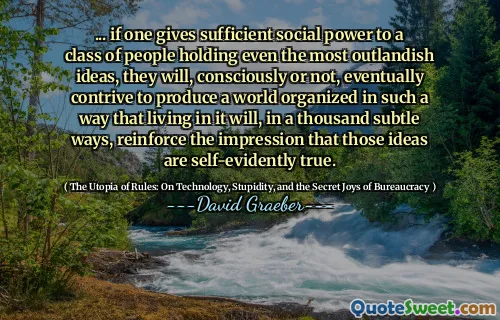David Graeber was a prominent anthropologist and activist known for his critiques of capitalism and his exploration of social relationships and economic systems. He gained fame for his book "Debt: The First 5,000 Years," where he argues that debt has historical and cultural significance, rather than merely being a financial instrument. Graeber's work often highlighted the moral implications of economic systems and challenged conventional wisdom, promoting the idea that alternative arrangements are possible. In addition to his academic contributions, Graeber was a key figure in the Occupy Wall Street movement, advocating for social justice and economic reforms. His involvement in activism influenced his writing and research, as he sought to connect theory with practical social change. He believed in the importance of direct action and the need for collective organizing to address issues of inequality and exploitation. Graeber's influence extended beyond anthropology; his thoughts on anarchism and anti-capitalism sparked discussions in various fields, including political theory and sociology. He took a critical stance towards bureaucracy and argued for more egalitarian social structures. Throughout his career, he challenged readers to rethink established norms and to consider the possibilities for a more just society.
David Graeber was a notable anthropologist whose work encompassed critiques of capitalism and alternative economic systems. His groundbreaking book, "Debt: The First 5,000 Years," explored the historical context of debt and its societal implications. Graeber encouraged a rethinking of conventional views on economics, advocating for a deeper understanding of moral and cultural relationships in financial practices.
Active in social movements, Graeber played a prominent role in the Occupy Wall Street protests, emphasizing the need for systemic change. His activism was not separate from his academic pursuits; rather, it enriched his scholarship. He called for collective efforts and direct action to confront issues of inequality, reflecting his belief in the power of grassroots organizing.
Graeber also engaged deeply with themes of anarchism, bureaucracy, and social relations. He inspired various discussions across diverse academic disciplines through his critiques of authority and his vision for a more equitable society. His legacy continues to encourage critical thinking about the structures that shape our lives and the potential for transformative social change.
More »
Today Birthdays
1729 -
Edmund Burke
1949 -
Haruki Murakami
1954 -
Howard Stern
1876 -
Jack London
1993 -
Zayn Malik
1951 -
Kirstie Alley
1863 -
Swami Vivekananda
1923 -
Alice Miller
1987 -
Naya Rivera
1825 -
Brooke Foss Westcott
1944 -
Joe Frazier
1951 -
Rush Limbaugh
1964 -
Jeff Bezos
1978 -
Jeremy Camp
1628 -
Charles Perrault
1856 -
John Singer Sargent
1970 -
Kaja Foglio
1953 -
Rick Santelli
1986 -
Gemma Arterton
1968 -
Raf Simons
1958 -
Christiane Amanpour
1966 -
Olivier Martinez
1996 -
Ella Henderson
1917 -
Maharishi Mahesh Yogi
1949 -
Ottmar Hitzfeld
1928 -
Ruth Brown
1968 -
Heather Mills
1946 -
George Duke
1968 -
Rachael Harris
1923 -
Ira Hayes


